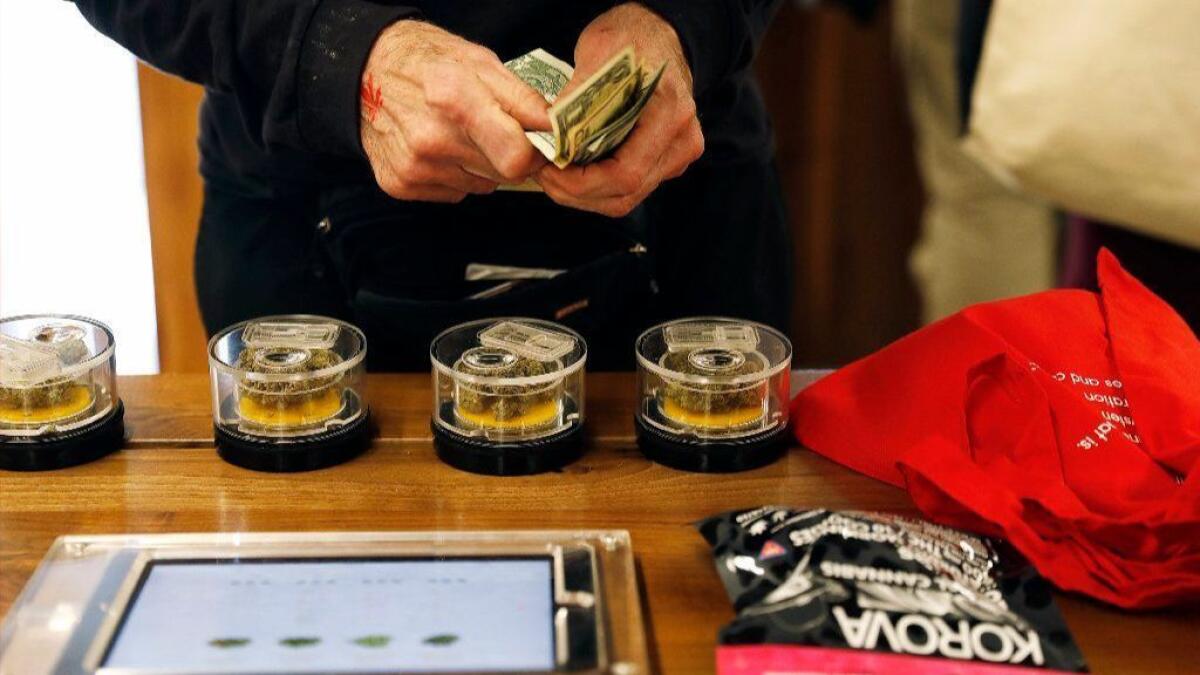Berkeley declares itself a sanctuary city for recreational cannabis — and it may be the first to do so

Berkeley has always prided itself as a pot-friendly place.
But now, the left-leaning city wants to make it more official.
The Berkeley City Council voted unanimously to declare the city a sanctuary for recreational marijuana, a move that may be the first of its kind.
The resolution, adopted Tuesday, prohibits Berkeley’s agencies and employees from using city resources to assist in enforcing federal marijuana laws or providing information on legal cannabis activities.
“The city of Berkeley does not support cooperation with the Drug Enforcement Administration in its efforts to undermine state and local marijuana laws,” the measure says.
Berkeley Mayor Jesse Arreguin said the move was a response to “threats by Atty. Gen. [Jeff] Sessions regarding a misguided crackdown on our democratic decision to legalize recreational cannabis.” Arreguin, Councilman Ben Bartlett and Councilwoman Cheryl Davila authored the resolution.
“We have become what may be the first city in the country to declare ourselves a sanctuary city for cannabis,” Arreguin tweeted.
Sessions in January ended an Obama-era federal policy that provided legal shelter for marijuana sales in California and other states that have allowed recreational pot. The 2013 policy, known as the “Cole memorandum,” provided clarity not just to marijuana businesses and users, but also to state and local law enforcement agencies, which now could find themselves working at cross purposes with their federal counterparts.
Berkeley’s sanctuary law does not cover other substances considered Title I drugs by the federal government, and it doesn’t prevent city resources from being used to investigate cannabis-related crimes that are illegal under federal laws as well as state and city laws.
“Millions of peaceful Americans have been fined, arrested, imprisoned, or otherwise needlessly criminalized and stigmatized, sometimes for life, because of their use of marijuana,” Arreguin said in a statement Wednesday afternoon. “Ending this misguided policy is long overdue.”
Berkeley has a long history of lenient marijuana laws. In 1979, voters passed the Berkeley Marijuana Initiative, which called for the city’s Police Department to make the possession, cultivation, sale and transportation of marijuana the lowest law enforcement priority. Decades later, in 2008, the City Council declared Berkeley a sanctuary for medical cannabis patients and providers.
California voters paved the way for recreational marijuana in November 2016, with Proposition 64 earning 57% approval statewide. Support was much higher in Berkeley, where 83% of voters supported the measure, according to city officials.
The ballot measure made California one of eight states to approve the sale of cannabis for recreational use. Those 21 and older can purchase and possess up to an ounce of marijuana for recreational use and grow up to six plants in their homes.
“Berkeley has always been a sanctuary city,” said Councilman Bartlett. “When Jeff Sessions announced he was repealing Obama-era protections on states’ rights in regards to cannabis, we decided to step up.”
The new resolution plays an “imperative” role in preventing “federal overreach,” he said.
“We will not allow the return of Prohibition,” he said. “It destroys communities of color, thwarts the will of the people and prevents a healthy economy from manifesting.”
For more California news follow me on Twitter: @sarahparvini
UPDATES:
2:55 p.m.: This article was updated with a statement from Berkeley’s mayor.
This article was originally published at 11:50 a.m.
More to Read
Sign up for Essential California
The most important California stories and recommendations in your inbox every morning.
You may occasionally receive promotional content from the Los Angeles Times.











